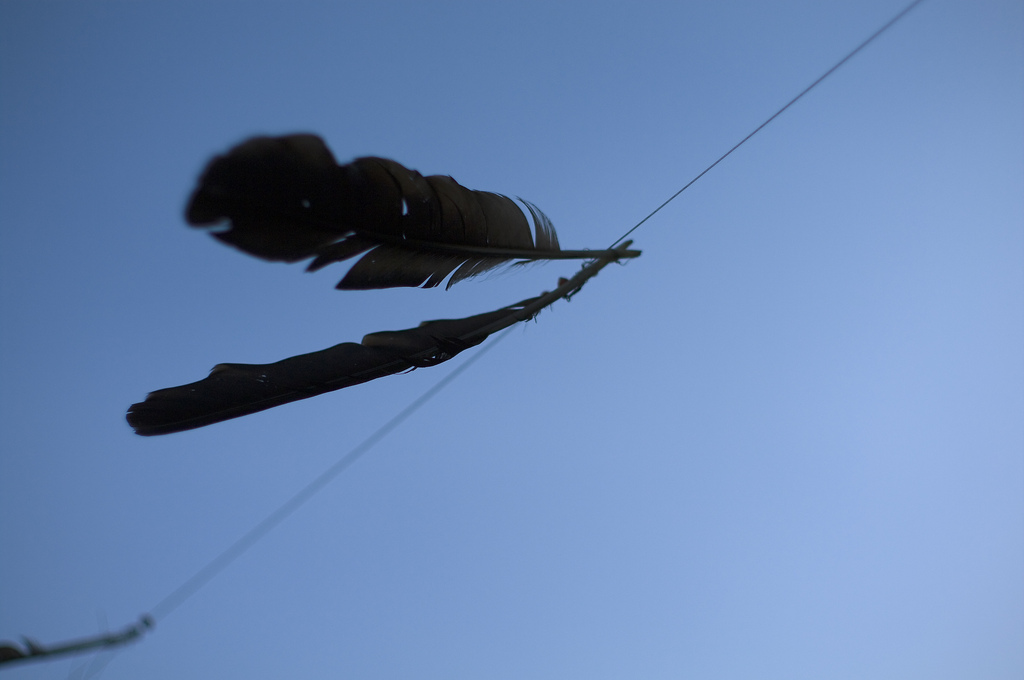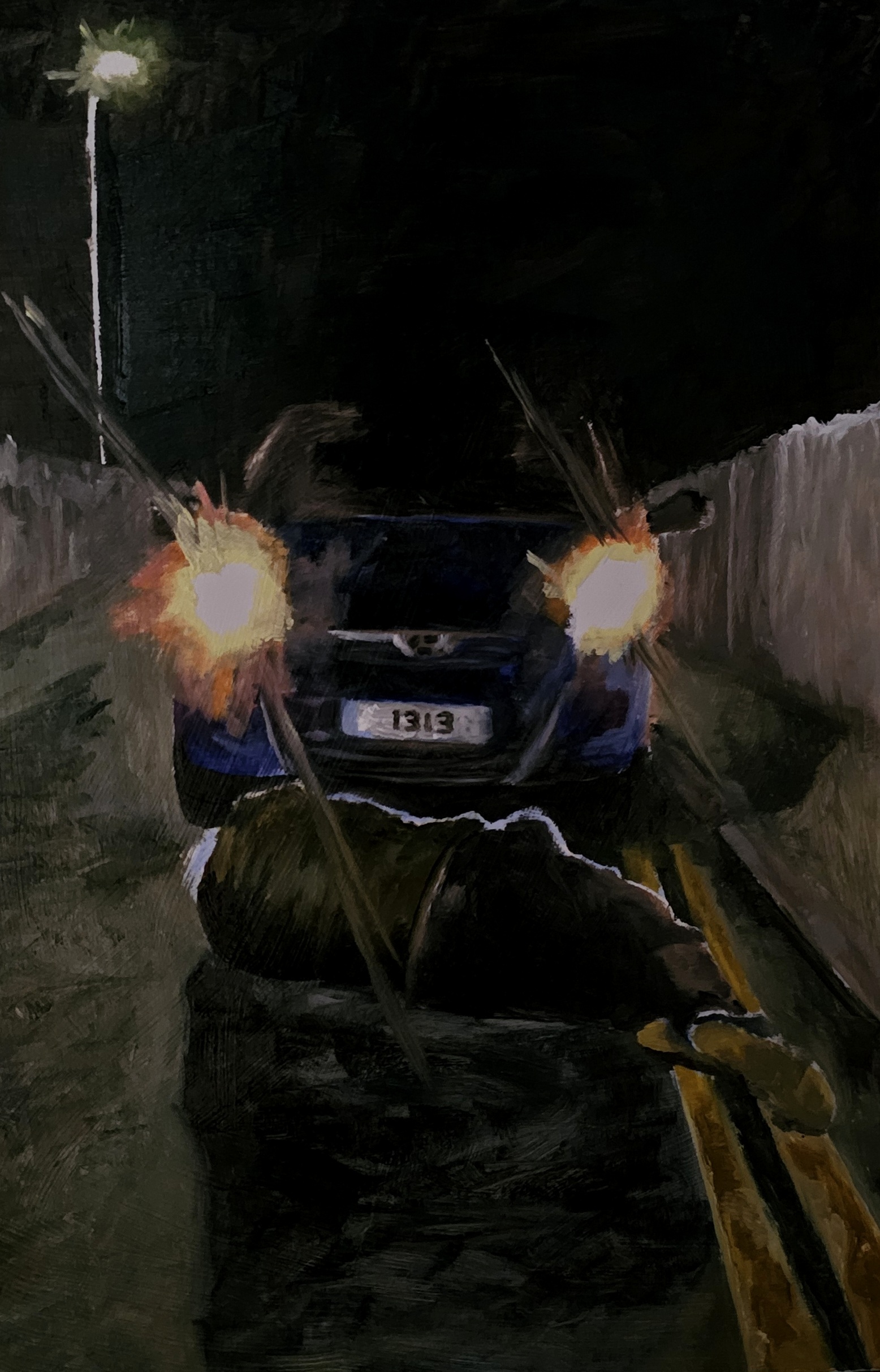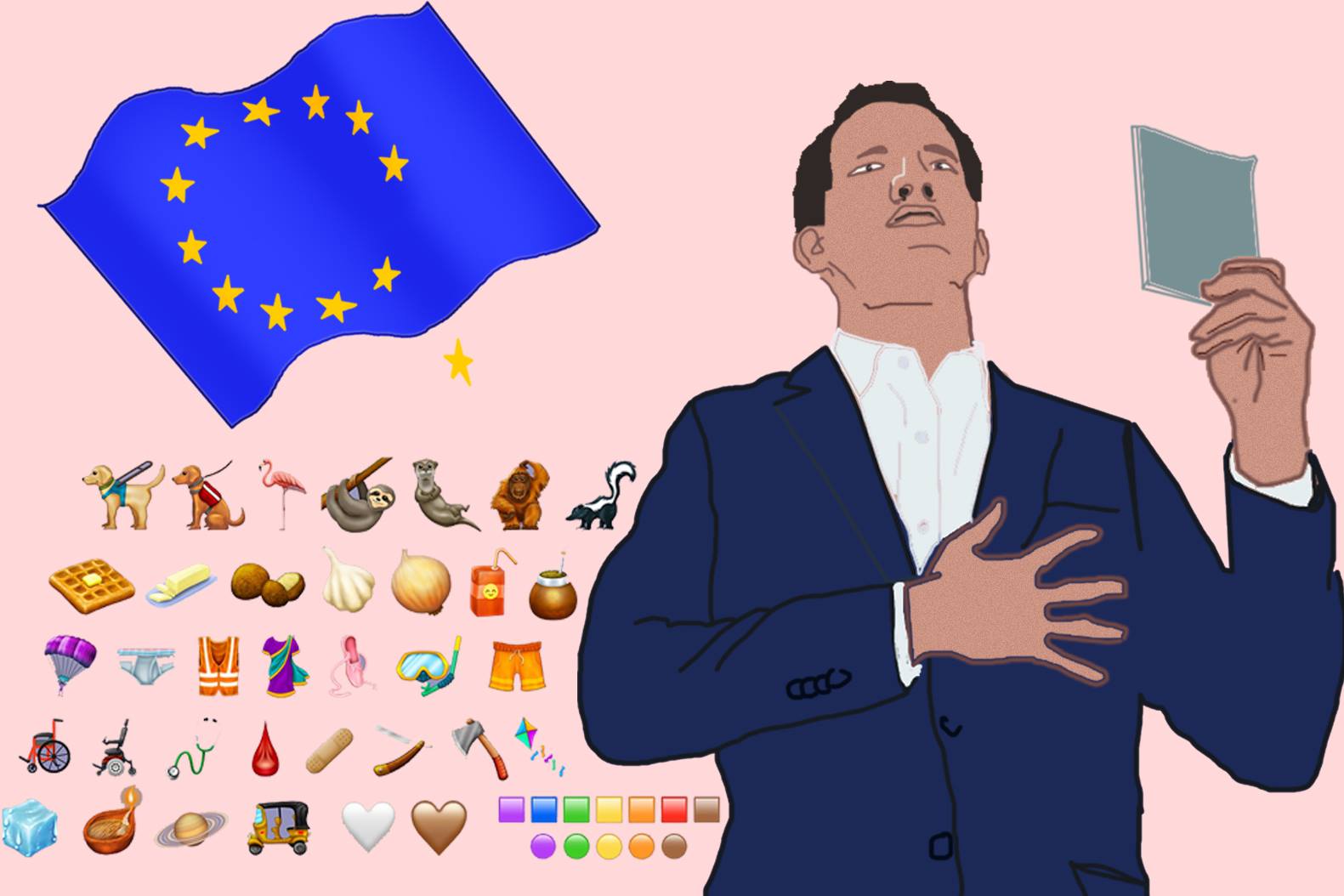
‘Prophesy, Darkness, Play’: An Interview with Max Porter
“A is to B what C is to A plus B less C. Lovely.” This is the family dynamic of Grief Is the Thing with Feathers, Max Porter’s debut novel, a slim book ostensibly about the “grief” of its title. Yet things are not quite as they seem: a dead mum has been replaced by Crow, a creature of the wild and the night who is going to teach the bereaved Dad and the Boys how to live again, in this surreal and acclaimed novel of undefinable spirit.
Porter’s own is the story of a world left without a centre of gravity. Aged 6, his father died, and he and his brother were brought up by his mother. It’s easy to draw parallels between Porter the writer and Porter the lost boy of the narrative. One of the most harrowing moments of the novel is the Boys’ joint realisation of their mother’s death, and the silence that accompanies it (“Where are the fire engines? Where is the noise and clamour of an event like this?”). Death isn’t like it appears in films, and Porter’s writing reveals the Boys’ pain at being forced to mentally create new identities as “brave new Boys without a mum”. Our youthful identities are intrinsically tied to our parents, a further, unseen, umbilical cord which gradually falls away. For the Boys, it is untimely broken, and the loss is like an amputation. Part of the book’s success has been due to its honest depictions of family relationships, the joshing that conceals real love: “We took the piss out of Dad, because that’s the way we knew how to love him best.” Now that Porter is a father himself, living in London with his young family, does he think his book would have been different had he written it without the the first-hand knowledge of having been in the roles of both “the Boys” and “Dad”, having already admitted that all the characters “borrow a little from me”?
“Certainly in attempting to write as truthfully as I could (not just as regards emotions, but also the practicalities, logistics and long-term implications of a sudden loss) I went to my own experiences. I made stuff up, based on my experiences, in order to get close to the sorest imaginable place, and try to adequately interrogate it.” The narrative’s subject matter of death, the raw, nagging emptiness of losing someone you love, is underscored by the character of Dad, who Porter describes as “the quiet realistic bass-line of the book’s music.”
If Dad is the bass-line in Grief’s symphony, Crow is the percussive drumbeat, wild and intruding. Crow’s first appearance slices straight through Dad’s “shuffling” haze of grief, as he enters the narrative in a sensory blur, “a rich smell of decay, a sweet furry stink of just-beyond-edible food, and moss, and leather, and yeast.” Crow is a “figment” of death who will, paradoxically, resurrect a family, literally taking both Dad and Boys under his wing, as they struggle through a new existence in a house “full of no-longer-Hers.”
In a work which has frequently been compared to nursery rhymes and folk tales, it seems fitting to call Crow the book’s equivalent to Mary Poppins and her umbrella: a feathery, feral fairy godmother. Why did Porter choose the symbol of a crow for his tempestuous caretaker? “I chose Hughes’s Crow because I wanted it to be a manifestation of one person’s obsession [Dad is a Ted Hughes scholar in the novel] so I could figure out some of my feelings about influence, homage, critical affection and so on.” Porter acknowledges his debt to the work of both Ted Hughes and Emily Dickinson, for providing “modes of expression, light and darkness”; the book’s striking epigraph is Dickinson’s poem “That love is all there is”, with the noun crossed out each time and replaced with a hand-scrawled “crow.” This type of playfulness is something Crow himself exhibits, and that Porter particularly liked when writing the “symbolic and narrative trickster. As he says himself, he is a device, and a nest of grieving children is a great challenge for a bird who for as long as stories have existed has been a figure of prophesy, darkness, play, threat and truth.”
“Motherless children are pure crow. For a sentimental bird it is ripe, rich and delicious to raid such a nest.”
Porter, by his own admission, “loathe[s] the way we fixate on poets not poetry”, and chose to make Crow a self-conscious ‘analyst’ of Hughes’s symbolic bird. His own Crow is combative, elemental, and as destructive as he is loving. I say “he”, but the question of whether Crow is more of a maternal or paternal figure is, says Porter, “pleasingly impossible to answer. I hope that in his blend of sympathy and disdain he is a critic of patriarchy, but can see its shambolic charm on the domestic level, as well as its lethal danger at the societal level.” The idea that Crow is, in Porter’s words, “a non-doctrinaire feminist” says much about the unorthodoxy of the book as a whole. While it has been called a novel, a novella, even a poem, Grief resists being pushed into a genre due to the flexibility and dexterity of its language. Crow’s dialect, in particular, is one of neologism, onomatopoeia, paronomasia, the character’s words uttered with relish and vitality; watching Dad sleep, Crow describes how
I plucked one jet feather from my head and left it on his forehead, for, his, head.
For a souvenir, for a warning, for a lick of night in the morning.
For a little break in the mourning.
I will give you something to think about, I whispered.
The gigantic presence of Crow’s language, especially when compared to Dad’s own vanquished voice, works to fill death’s void until time itself fills it back up. There is a video of Porter on YouTube reading aloud from his novel which makes it seem an obvious candidate for working best when read aloud. Its language is almost that of spoken word poetry: rhythmic, hypnotic, cacophonous with alliteration. Just as the aural quality of the text is essential to its impact, so too is its visual presentation. Porter’s artistic direction is bold: he chooses not to fill each corner of the page with language, instead leaving large swathes of blank whiteness, double-spaced lines and paragraph breaks. This fractured form reflects Porter’s interest in “the lateral axis” of literature – he espouses the idea that artistic work should be “polluted, and pollutable”, susceptible to influence and responsive to change; a book that is, itself, “crow-like”. As a writer, he seems to be attracted to the messy, to the grey areas of human experience; by laying his text out so unusually, he creates a canvas “more appropriate for an emotionally chaotic experience than pure prose, neat plotting.”
An infatuation with “the electric possibilities of the move between forms” also had an impact: in his day job, Porter is a senior editor at Granta. His creative life is, he says, defined by “a tension between music, art, and literature”. The highest compliment he has received about his book is that it seems more like a piece of music, or a sculpture, than a novel; Porter clearly doesn’t regard his work as isolated, and these comparisons make him feel that he has produced something “alive, generative, generous.” The figure of Crow, the surreal absurdity of moments such as when he “snack[s] a little on the unbrushed teeth”, or suddenly begins a fairy tale, continually take the reader aback, and elevate Porter’s book beyond anything that could be described as “self-help”. Was he looking to create something which could help others deal with grief? Porter doesn’t think it is his place to say: if he’d had grieving imaginary readers in mind, “it wouldn’t have worked.” But, he admits, the book does seek to counter some of contemporary culture’s triter responses to grief. “I think in an area of human experience like mourning, we have a toxic tendency towards cliché and banality. If I (or my crow) can rip into that a bit, lay it bare, introduce other medicinal storytelling opportunities beyond notions of ‘moving on’ or ‘recovering’, and that appeals or moves people, then I can only be grateful. I’m glad to have given people something to chew on.”
Nevertheless, Porter maintains that work “mustn’t concern itself with reception.” When it comes to the success of his novel, from his work in publishing he can see why it might have been a hit, but he remains circumspect about critical response: “I try not to let criticism hurt, just as I try not to let praise charm.” There is something endearing about his take on prizes as “weird and a bit terrifying”, even after having received widespread national acclaim, although he concedes that he is “really happy about the Dylan Thomas listing because my Welsh Granny would have been thrilled.”
Porter’s novel is not what it first appears to be. Apparently a slim exposition on grief, it soon becomes something else altogether: intensely personal, linguistically experimental, sometimes harsh, the working example of the “medicinal literature” genre Porter himself has created. Life is uncomfortable, and the novel never shies away from that fact: the novel’s examination of the realities (and surrealities) of grief can be excruciating. But, by its end, language has been euphorically released. Crow’s absence creates a chance for Dad and the Boys to reunite as they say goodbye to Mum, scattering her ashes “which rise up like birds”; incidentally, how Porter also describes his book, now it has “flown off into the world and is no longer just mine.” The final juxtaposition of the words “Unfinished. Beautiful. Everything” may tie up this moment for Dad and the boys, but the three minor sentences hold a different meaning: one of the necessarily unfinishable task of living. Death is the only end, but it has given life to one of the most thought-provoking novels of recent years.







